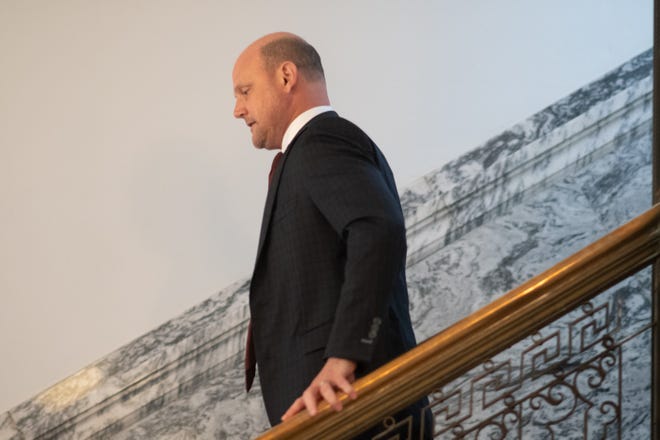SOS Scott Schwab broke KORA law in Kansas election poll data request
Secretary of State Scott Schwab violated the Open Registration Act by withholding provisional voting data from a civic engagement group, the Kansas Court of Appeals ruled Friday.
The case was brought by Davis Hammet, of Loud Light, with help from the ACLU.
“This is a clear victory for government transparency and access to public records,” said ACLU attorney Josh Pierson, who argued the case.
It stems from a request for provisional voting records, which the Secretary of State’s office was able to generate before removing this feature.
“When the Secretary directed ES&S to disable the computer function that generates the detailed report of the interim ballot – a report properly declared to be a public record – he denied reasonable public access to that public record,” Judge Stephen said. Hill in the decision. “This denial of public inspection of a public record violates the Kansas Open Records Act.”
Hill wrote the unanimous opinion overturning the decision of Shawnee County District Court Judge Teresa Watson. The matter now returns to Watson with instructions to order Schwab to restore the reporting function.
“We received it this morning and are reviewing it,” Schwab spokeswoman Whitney Tempel said in an email.
Schwab, a Republican, is up for re-election and has a primary challenger in the Aug. 2 ballot.
The appeals court gave no direction regarding costs and penalties. However, he noted that the district court can award attorney fees if Schwab’s actions were not in good faith and that civil penalties can be imposed on the agency if it intentionally refuses to provide the records.
Helping Voters Fix Deficiencies in Provisional Ballots
The Voter Information System, known as ELVIS, is the statewide voter registration database. Schwab had ordered the state’s computer software vendor to disable an ELVIS computer feature that generated a detailed interim report on the ballot. The report contains data on provisional ballots entered by county election officials.
Counties are not required by law to track provisional ballot data, but many choose to do so.
Hammet’s goal was to identify people who had voted provisionally so that his civic group could help them resolve any issues that were preventing their votes from being counted.
“Four years ago I started investigating the thousands of ballots thrown away in every election,” Hammet said. “Requests for open records for provisional voting data allowed me to expose illegal policies that disenfranchised voters and allowed Loud Light to launch programs to ensure Kansans’ votes are accounts.”
He has long sought such records, with a request in 2019 for 2018 election data. After the Secretary of State’s office denied that request, he filed a lawsuit in 2020. Schwab eventually provided the report of 2018 after a court order to that effect.
Hammet then requested the same report for the 2020 primary election. Two days after Schwab produced these reports, he asked the software vendor to remove the ability to create reports.
After:Court orders election official to release records
Judges: Lower court ruling would have overturned KORA
The company implemented the change in September, essentially eliminating the government’s ability to quickly and cheaply comply with another request Hammet filed in October.
Hammet ultimately lost a second lawsuit because Watson ruled the report was no longer a public record after Schwab asked the company to remove the ability to produce it.
The appeals court disagreed. They said the data collected by the Secretary of State’s office is a public record. None of the 55 exceptions to the State Open Archives Act applied in the case.
“This ruling would allow all computer records of public information to become inaccessible by the simple manipulation of what the computer system is instructed to do,” Judge Hill said of the lower court’s legal reasoning.
The effect would be to nullify KORA in the age of computer records, the higher court ruled.
“Today’s decision illuminates the darkness of Kansas’ secret government,” Hammet said.
After:Judge rules Kansas secretary of state did not violate open records law in dispute over ballot report
Court: Schwab violated public records law twice
While arguing that his motives are irrelevant, “the secretary never really offered a reason why” he had the feature removed after losing the first lawsuit, Hill wrote. There is no evidence to suggest he improved ELVIS or reduced government costs.
“Put simply, the secretary didn’t want it,” Hill said.
Schwab violated the Open Records Act, the appeals court said, when he disabled the IT function and again when he demanded excessive fees to hire a data scientist to write a script to extract the data.
“This reporting feature may not have been helpful to the secretary, but it was helpful to Hammet and the public,” Hill said. “And that’s the goal of open public archives. Public access is the rule, not the exception.”
Jason Tidd is a reporter for the Topeka Capital-Journal. He can be reached by email at [email protected]. Follow him on Twitter @Jason_Tidd.


Comments are closed.